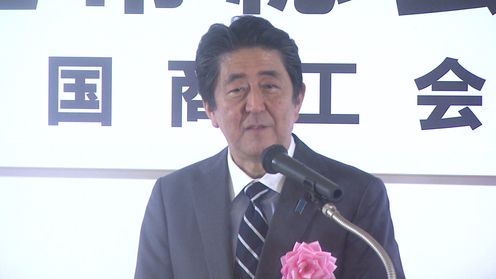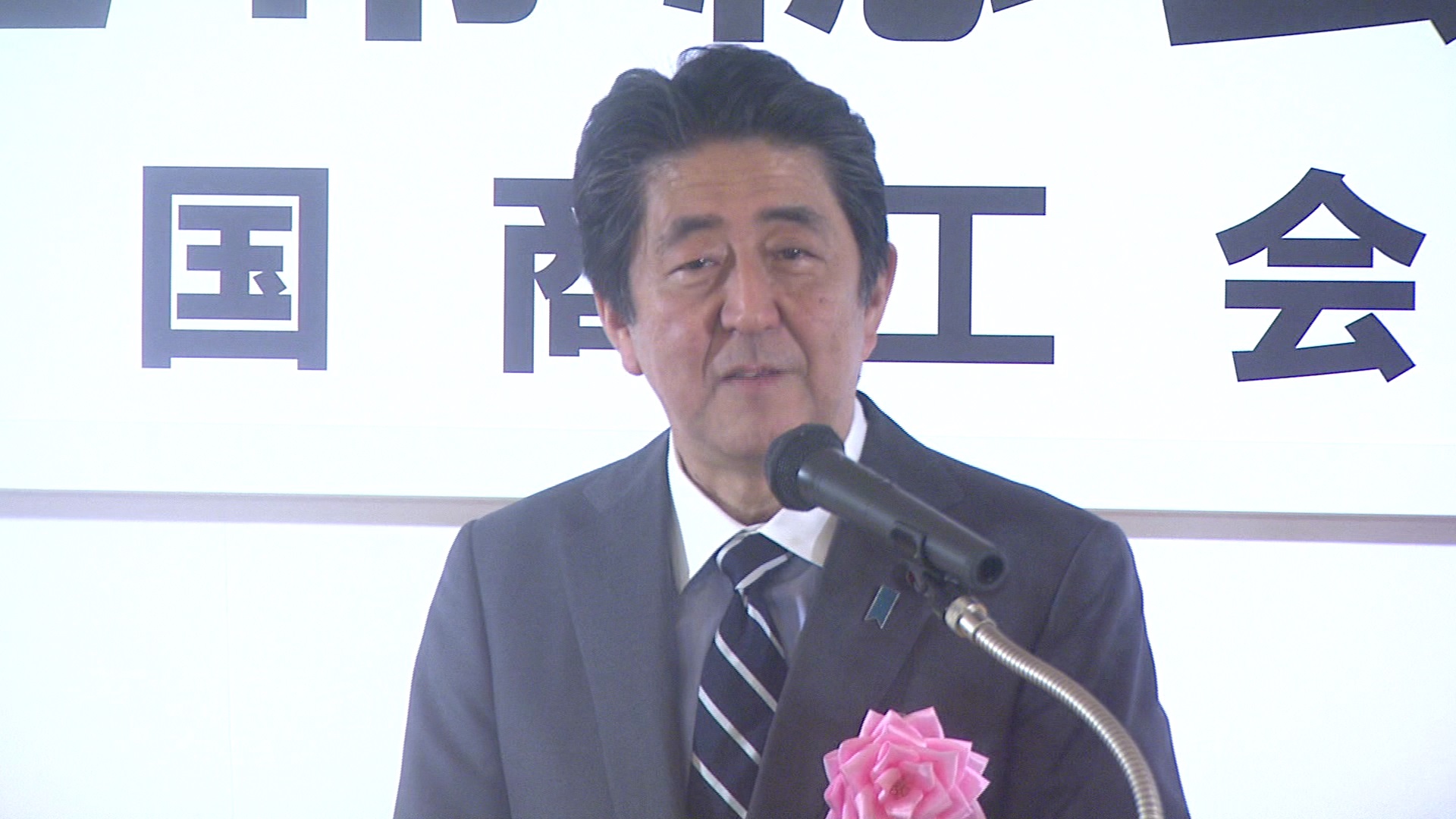Home > News > The Prime Minister in Action > May 2019 > Reception at the Annual National Convention of the Central Federation of Societies of Commerce and Industry
The Prime Minister in Action
Reception at the Annual National Convention of the Central Federation of Societies of Commerce and Industry
May 31, 2019
[Provisional Translation]
On May 31, 2019, Prime Minister Shinzo Abe attended a party held as part of the 58th National Convention of the Central Federation of Societies of Commerce and Industry in Tokyo.
The Prime Minister said in his address,
“The Minister of Economy, Trade and Industry usually attends this occasion, but he is currently on a business trip. Of course, I am not here in lieu of the Minister of Economy, Trade and Industry. Parliamentary Vice-Minister Ishikawa is attending on behalf of the Minister of Economy, Trade and Industry. I am just attending this occasion to meet with all of you, who represent the 800,000 members of the Societies of Commerce and Industries across the county..
I am aware that there are also many press members here today, but I will not talk about winds. I would like to talk about something important to you. To begin with, let me thank you for inviting me to this occasion.
I would also like to express my sincere appreciation to Chairperson Mori. Since his inauguration in June of last year, he has been travelling actively across the country, and delivering the voices on the grounds directly to the Government.
It has been six and a half years since the inauguration of the Abe Cabinet. There will be no true revitalization of the Japanese economy unless we see the success of micro, small and medium sized enterprises (SMEs), which are the backbone of the Japanese economy. With that belief, we have been implementing every possible policy to that end.
Five years ago, we established the Basic Act for the Activation of Small-sized Enterprises for the first time in history. We also established a highly flexible microbusiness sustainable subsidy with which we have funded as many as 100,000 projects to increase productivity, approximately 50 billion yen in total, over the past five years. In response to your requests, we have included this sustainability subsidy in this year’s initial budget for the first time. This is what many Diet members, including Mr. Miyamoto, has strongly requested to us. Together with the establishment of a new framework that can reduce property tax to zero over three years, we will continue to support your efforts to improve productivity all across the country.
Despite these efforts, there also remain concerns over the shortage of human resources. From this April, we have launched a new system for the acceptance of experienced foreign human resources with specific expertise and skills.
With respect to the improvement in subcontracting practices, we have made efforts as much as the previous Cabinets. For the first time in 13 years, we amended the Guidelines concerning the Act against Delay in Payment of Subcontract Proceeds, Etc. to Subcontractors and doubled the number of reference cases of the violation of this act, including the abuse of buying power, in response to the recent cases of harassment against subcontractors. We have also strengthened the government oversight by increasing the number of so-called G-Men to a 600-personnel scale.
We also reviewed the notification on the payment by note for the first time in 50 years, requiring cash payment for subcontracting bills in principle.
I believe that there will be no success of Abenomics without a virtuous economic cycle such that the fruits of economic growth shall trickle down with certainty to not only large companies but also micro, small and medium sized companies who are the subcontractors.
In addition, there is one thing that is required not of the owners of large companies but of the owners of micro, small, and medium sized enterprises; that is individual bonds. Once you fail, you lose everything. That prevents the owners from making another challenge. We must end this practice of overly focusing on individual bonds and have been making all-out efforts since the inauguration of my administration.
Five years ago, we started using the Guidelines for Personal Guarantee Provided by Business Owners. As a result, the share of new lending by private financial institutions without personal guarantee has increased up to 20 percent. The Shoko Chukin Bank and Japan Finance Corporation have already lent more than 10 trillion yen with no personal guarantee.
There are, however, still many things to do. Just the other day, I heard a story: the son of the owner of a small construction company, who was an office worker himself, saw how hard his father was working to support his community, and felt that he could not let his father’s business close. He also felt empathy for the employees, so he made up his mind to take over the family business. His father was extremely pleased that his son had finally resolved to do that. The local bank, however, required a personal guarantee from the son for a loan. The son’s family was strongly opposed to that, and even his wife said that if he guaranteed the loan, she would consider divorcing him. That is how strong their opposition was and the son unfortunately abandoned his wish to take over his father’s business. Such cases actually happen quite often.
Micro, small and medium enterprises are Japan’s treasure. Such situations in which these businesses are forced to close because of the absence of successors is a huge loss for the Japanese economy.
Last year, we implemented a measure to exempt inheritance tax and donation tax when inheriting the business, which we had never seen before. Following that, the number of business inheritances has increased by tenfold. From this year, we have also expanded this measure to include individual business owners. That is not, however, enough. According to a survey, there are many cases in which business owners cannot inherit their businesses despite the fact that they have a successor. 60 percent of them raised individual bonds as the reason they could not inherit the business like the story I introduced to you earlier.
We must not pass on this practice of individual bonds to the next generation. We intend to implement a bold policy package with the strong determination to eliminate this practice in this generation.
First, moving forward, the Shoko-Chukin Bank will offer lending without individual bonds, in principle. This will free up guarantee requirements for 20,000 loans annually.
Concerning loans from private financial institutions, we will make a special provision on the Guidelines for Personal Guarantee Provided by Business Owners, focusing on business inheritances. There are 10,000 annual cases asking for individual bonds from both the previous business owners and their successors simultaneously. We will prohibit this practice in principle.
Furthermore, we will introduce a new scheme in which the Credit Guarantee Corporations will provide guarantee without any individual bond when the successors obtain a loan. We will support the improvement of management by business successors and waive the guarantee fee for those successors who obtained the confirmation by experts following the Guidelines. As interest rates are currently low, we will increase the momentum at once towards business inheritances by creating such an easy-to-access system.
The new era of Reiwa has begun and, I believe, the first step to create a business environment befitting the new era for micro, small, medium-sized enterprises is the departure from individual bonds.
As the first major policy in the Reiwa era, we intend to incorporate this so-called individual-bond-exit policy package into the growth strategy and implement them swiftly with the Government and the ruling parties working as one.
To that end, above all, the cooperation of the 1,660 Societies of Commerce and Industry across the country is indispensable. I hope to pave the way of the new era in solid collaboration with all of you.
What do you think is the foundation to implement bold policies? I will tell you all; it is political stability. Without political stability, there will be no economic stability.
This is the year of the boar. I also served as the Prime Minister during the previous year of the boar, twelve years ago. At the House of Councillors election held that summer, the Liberal Democratic Party (LDP) was regrettably defeated. It was my fault as then-President of the LDP. That defeat is a memory that remains deeply engraved upon my heart today. We had a divided Diet, which consequently led to a change of Prime Minister every year, including myself. The prolonged deflation and the downturn of local economies were left neglected and the economy suffered a slump. The number of bankruptcies among micro, small, medium size enterprises were 30 percent larger than today.
I could not regret this more than I did. My deep reflections of 12 years ago have laid the foundation of my government management today.
I am determined not to let the economy fall back into the turmoil of that period.
We often see politicians saying ‘let’s stop for a second and think about it,’ which sounds nice on the surface. That is a mere deferral. Japan no longer has the luxury of time to spare. We do not have the time to look back on the past.
We must bring a Japan of the new era forward together, by surely implementing bold policies such that those who work really hard in local communities feel energized from the bottom of their hearts.
I would like to end my remarks by sincerely asking for your understanding and strong support. Last but not least, let me say it once again. What is important for a strong economy? That is political stability. I am certain that you all know what is important for such political stability and will not go further. I would like to ask for your understanding. Congratulations on today’s successful event.”


